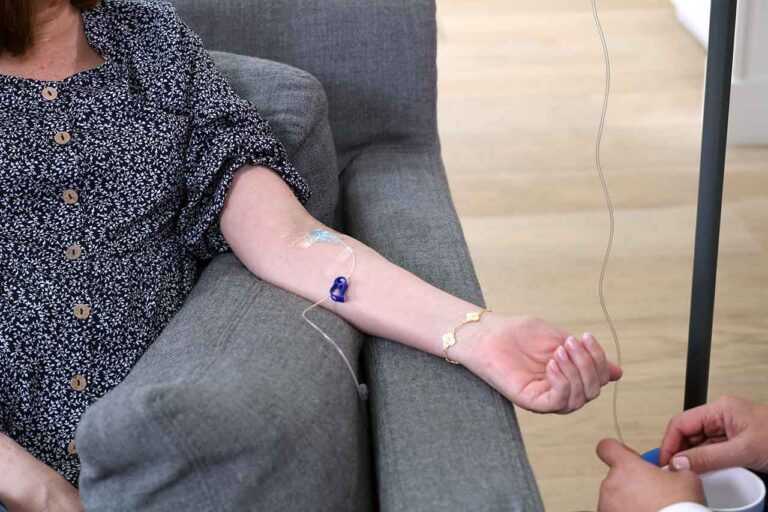
In general, intravenous immunoglobulin (IVIG) therapy is considered a standard, effective, and safe treatment. Although IVIG treatment is well-tolerated, adverse long-term side effects may occur.
Get Your IVIG Dose
At-Home InfusionIVIG is primarily used to treat a wide array of life-threatening disorders in which patients either have a dysfunctional immune system or are deficient in immune components such as antibodies. This therapy increases the life expectancy of patients suffering from immunodeficiency, autoimmune, and neurologic disorders and improves their quality of life.
If patients are suffering from primary and secondary immunodeficiency and require repetitive infusions of IVIG, this treatment can be lifelong. These patients often experience common side effects and sometimes may suffer from IVIG long-term side effects as well.
Side Effects of IVIG
Common Side Effects of IVIG
The side effects of IVIG may vary from patient to patient, depending on their health status. Approximately one-fourth of patients experience some common IVIG side effects over the course of their IVIG treatment.
If you are receiving larger doses of IVIG, you may be more likely to experience mild and transient IVIG side effects.
Common side effects include:
- Headache or nausea
- Flushing
- Malaise
- A chill or a fever
- Stomach pain
- Chest discomfort
- Fatigue
- Lethargy
These minor IVIG symptoms can be dissipated by slowing the IV infusion rate. However, if you feel a persistent headache or any other symptoms mentioned above that do not settle down during or after the infusion, then consult your healthcare provider immediately.
Get IVIG Copay Assistance
IVIG Financial AssistanceAdverse and Long-term IVIG Side Effects
Unlike some disorders that respond to a single course of IVIG therapy, patients with chronic illnesses require repetitive IVIG infusions. For instance, in the case of primary immunodeficiency (PID) or neurologic disorders, a patient may require chronic IVIG treatment over a long period of time to maintain improvement.
Limited data is available on the long-term side effects of IVIG. In very rare cases, it has been reported that chronic IVIG therapy can lead to severe side effects such as:
 1. Renal and Hematologic Side Effects
1. Renal and Hematologic Side Effects
Research hints that patients on long-term IVIG therapy are more prone to renal failure (a condition in which a person’s kidneys stop working and are unable to filter blood and remove waste products from the body).
Supporting this hypothesis, a retrospective study conducted on 166 patients with neurologic disorder showed a decline in hematocrit (blood level) and a 20% or greater decline in GFR (glomerular filtrate rate). These patients received IVIG infusions with a dose range of 0.441 – 2.58 g/kg/month for 1 year.
2. Thromboembolic Complications
Thromboembolic complications also fall into the category of long-term IVIG side effects. If a patient has a previous history of coronary artery disease or cardiovascular disease and is receiving IVIG infusion on a long-term basis, then the incidence of thromboembolic complications is higher in these patients.
One study revealed that 11.3% of patients on regular IVIG treatment showed thromboembolic complications over a 24-month period. The researchers suggested that IVIG may have a contributing role in thromboembolic complications.
3. Aseptic meningitis
Patients on IVIG treatment also experience acute aseptic meningitis (a condition in which the membrane called meninges covering the CNS becomes inflamed). Though the exact pathophysiology of aseptic meningitis is unclear, existing literature reveals that this is an IVIG-induced side effect.
Conclusion
Based on extensive research, IVIG treatment is considered a safe and effective treatment for managing various medical conditions. Long-term side effects may occur; however, they are rare, and data on IVIG’s long-term side effects are still scarce.
If you are interested in learning more about the different aspects of IVIG, visit our IVIG Patient Resource Hub.
REFERENCES:
- Levine, A. A., Levine, T. D., Clarke, K., & Saperstein, D. (2017). Renal and hematologic side effects of long‐term Intravenous immunoglobulin therapy in patients with neurologic disorders. Muscle & Nerve, 56(6), 1173-1176.
- Kapoor, M., Spillane, J., Englezou, C., Sarri-Gonzalez, S., Bell, R., Rossor, A., … & Carr, A. (2020). Thromboembolic risk with IVIg: incidence and risk factors in patients with inflammatory neuropathy. Neurology, 94(6), e635-e638.
- Rajabally, Y. A., & Kearney, D. A. (2011). Thromboembolic complications of intravenous immunoglobulin therapy in patients with neuropathy: a two-year study. Journal of the neurological sciences, 308(1-2), 124-127.
- White, D. A., & Leonard, M. C. (2007). Acute stroke with high-dose intravenous immune globulin. American journal of health-system pharmacy, 64(15), 1611-1614.
 1. Renal and Hematologic Side Effects
1. Renal and Hematologic Side Effects












